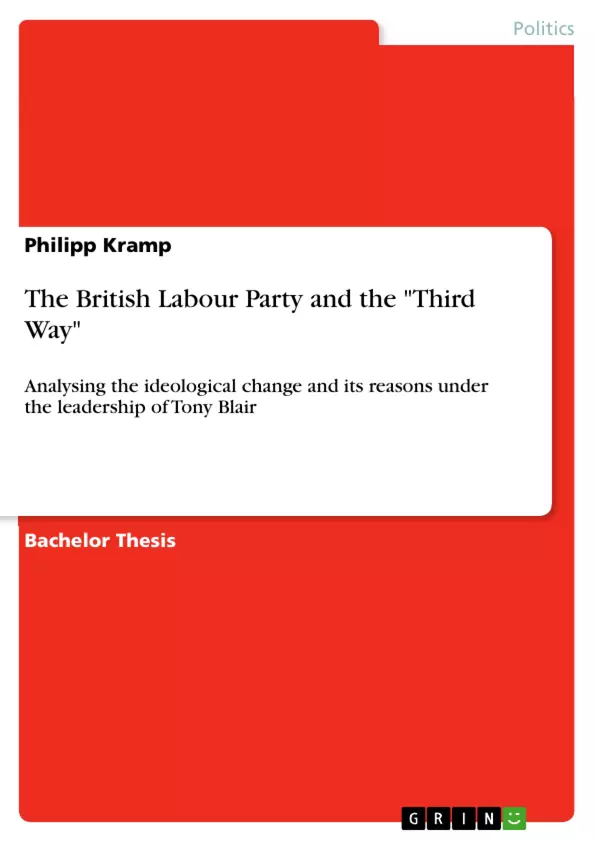Die Arbeit wurde in englischer Sprache abgefasst.
In der vorliegenden Arbeit soll der Einfluss des ‚Dritten Weges‘ auf die englische Labour Party geklärt werden. Zu Beginn der Arbeit untersuche ich, ob der ‚Dritte Weg‘ als Ideologie zu bezeichnen ist. In diesem Kontext kläre ich die wichtigsten Punkte des Politikansatzes anhand eines Rasters von Andrew Heywood in Abgrenzung zum tradierten sozialdemokratischen Ansatz. Dies geschieht um nachzuvollziehen, dass es sich beim ‚Dritten Weg‘ um einen durchdachten Politikansatz handelt und nicht um lose Fragmente politischer Ideen. Darüber hinaus können hierdurch die größten Unterschiede zur alten Sozialdemokratie besser betrachtet werden. Nachfolgend bestimme ich die Einflussfaktoren, die die Labour Party dazu motiviert haben, die Modernisierung ihres Politikkonzeptes voranzubringen. Dabei werden Faktoren innerhalb und außerhalb der Partei betrachtet.
Wir müssen bedenken, dass es sich beim ‚Dritten Weg‘ um einen Zwitter handelt. Auf der einen Seite ist es ein umfassender Politikansatz, gleichzeitig aber auch eine Strategie zur Maximierung des Wahlerfolges. Ich vergleiche diese Strategie mit dem Konzept des Parteienwettbewerbes von Anthony Downs.
Zum Ende der Arbeit kläre ich den Einfluss des Konzeptes auf die Partei und die Frage zur Implementierung des Politikansatzes. Innerhalb der Arbeit wird eine Frage aufgeworfen, die nicht beantwortet werden kann. Wenn wir die Zielstellung zur Maximierung des Wahlerfolges betrachten, dann ist die Frage, ob die Modernisierung der Partei für diesen Wahlerfolg erforderlich war, von besonderer Bedeutung.
Im Fazit fasse ich die Ergebnisse der vorangegangenen Kapitel zusammen.
Inhaltsverzeichnis (Table of Contents)
- Introduction
- The 'Third Way' – major changes in the political ideology
- Ideology
- Account of existing order
- Vision of a "good society"
- Theory of political change
- Interim conclusion
- The reasons of the ideological change
- Reasons within the Labour Party and its history
- Reasons within the society in the 1990s
- The 'Third Way' as an electoral strategy
- The impact of the 'Third Way'
- Critique
- Conclusion
Zielsetzung und Themenschwerpunkte (Objectives and Key Themes)
This paper examines the influence of the 'Third Way' on the British Labour Party. It analyzes the ideological changes under Tony Blair's leadership and explores the reasons behind this transformation.
- The definition of the 'Third Way' as an ideology
- The core ideas of the 'Third Way' and its distinction from traditional social democracy
- The factors that motivated the Labour Party to modernize its political concept
- The 'Third Way' as an electoral strategy
- The impact of the 'Third Way' on the Labour Party
Zusammenfassung der Kapitel (Chapter Summaries)
- The introduction sets the stage by outlining the context of the 'Third Way', highlighting its relevance to the Labour Party's modernization and the changing political landscape of the 1990s.
- Chapter two analyzes the 'Third Way' as an ideology by examining its core components and comparing it to the traditional social democratic approach. This chapter aims to demonstrate that the 'Third Way' is a well-defined political strategy and not just a collection of loosely related ideas.
- Chapter three delves into the reasons behind the Labour Party's ideological shift. It examines both internal and external factors that contributed to the modernization process, focusing on the party's history and the social and political environment of the 1990s.
- Chapter four focuses on the 'Third Way' as an electoral strategy, comparing it to Anthony Downs' theory of party competition.
- Chapter five explores the impact of the 'Third Way' on the Labour Party, examining its implementation and consequences.
Schlüsselwörter (Keywords)
The primary focus of this work is on the 'Third Way' as an ideological shift in the British Labour Party, particularly during Tony Blair's leadership. Key themes include the evolution of social democracy, the modernization of political parties, electoral strategies, and the role of ideology in political change. Important concepts include the ‘Third Way' as a political philosophy, the Labour Party's history, and the context of the 1990s.
Frequently Asked Questions
What is the "Third Way" in British politics?
The 'Third Way' is a political approach adopted by the British Labour Party under Tony Blair, aimed at modernizing social democracy and finding a middle ground between traditional socialism and neoliberalism.
Is the 'Third Way' considered a formal ideology?
The paper examines this question using Andrew Heywood’s framework, concluding it is a well-defined political strategy rather than just loose fragments of ideas.
What motivated the Labour Party to adopt this change?
Factors included internal party history and external societal changes in the 1990s that demanded a modernized political concept to remain competitive.
How does the 'Third Way' relate to electoral success?
It served as an electoral strategy to maximize votes, which the paper compares to Anthony Downs' theory of party competition.
Who was the key figure associated with the Third Way in the UK?
Tony Blair is the central figure who led the ideological transformation of the "New Labour" party.
- Quote paper
- Philipp Kramp (Author), 2010, The British Labour Party and the "Third Way", Munich, GRIN Verlag, https://www.grin.com/document/161125



